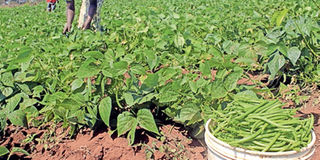Brief news on farming and agribusiness from around the country

Vihiga County Government and Meru Greens Horticulture Limited, have partnered to reintroduce green gram cultivation in the county. Farmers with at least an eighth of an acre are targeted with the company seeking to grow the crop on 30 acres in total. PHOTO | ELIZABETH OJINA | NMG
What you need to know:
- Farmers abandoned cultivation of the crop in the early 1990s due to poor returns and lack of ready market. The firm will market the produce for 1,000 contracted farmers.
- The testing of produce is meant to address concerns over contamination of agricultural produce with chemicals used on the farm.
- Dubbed National Agricultural and Rural Inclusive Growth project, it aims to boost farmers’ earning as well as encourage value addition and improve food security.
French beans farming makes a comeback in Vihiga County
French beans farming is set to be reintroduced in Vihiga County following a partnership between the county government and Meru Greens Horticulture Limited.
Farmers abandoned cultivation of the crop in the early 1990s due to poor returns and lack of ready market. The firm will market the produce for 1,000 contracted farmers.
Horticulture Crops Development Authority western manager Florence Khaemba said the initiative is meant to revive the venture in the county, with the project targeting the export market.
“Currently, farmers have prepared their land awaiting the rainy season to start planting. The programme will run for a year,” she said.
Meru Greens will provide farmers with seeds, fertiliser and chemicals. “Farmers will receive about 600g of Goal seed variety, 3kg of fertiliser for top dressing and chemicals. The whole cost sums up to Sh2,300 for each farmer,” she said.
Farmers with at least an eighth of an acre are targeted with the company seeking to grow the crop on 30 acres in total.
“After 55 days, the beans should be ready for harvest because of the favourable temperatures,” she said. We target the first grade harvest, which will be done three times weekly,” she said.
— Elizabeth Ojina
****
Firm to protect consumers from pesticide residue
Agro-processor Twiga Foods is setting up facilities to test fruits and vegetables sourced from farmers for pesticide residues to ensure safety of consumers.
The testing of produce is meant to address concerns over contamination of agricultural produce with chemicals used on the farm.
The food safety initiative follows the recent signing of a $5 million (Sh500m) financing deal with the US Overseas Private Investment Corporation to expand the firm’s distribution network and improve food security and agricultural wages for farmers it works with.
Mr Kikonde Mwatela, the chief executive, said the firm is committed to ensuring high food standards are maintained from farm to fork.
He said the firm will help farmers access reliable markets. Twiga will work with the Agriculture Food Authority and Kalro to ensure the safety standards are maintained.
On average, the firm handles 130 tonnes of fruits and vegetables daily, providing a reliable market for 8,370 farmers.
— Faith Nyamai
****
World Bank unveils Sh120m food programme in Migori
The World Bank has announced a Sh120 million programme in Migori County to promote agricultural production.
Dubbed National Agricultural and Rural Inclusive Growth project, it aims to boost farmers’ earning as well as encourage value addition and improve food security.
Mr Parmesh Shah, the team leader of the programme, said the project will ensure farmers enjoy increased profitability.
“Most of the issues that Migori face is because it is a remote county. The county is importing plenty of food but it has to improve its own productivity,” the World Bank official said.
Migori Deputy Governor Nelson Mahanga Mwita said the programme’s focus is the improvement of agro-production.
“The programme is funded by the World Bank to the tune of Sh20 billion and Migori is lucky to benefit,” he said.
In Migori, the programme is being piloted in six sub counties and it will focus on bee-keeping and honey processing, poultry and growing of maize, beans and bananas.
The global lender is working with 21 county governments.
— Vivere Nandiemo





